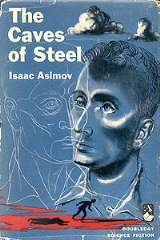
The Caves of Steel
Overview
Isaac Asimov
Isaac Asimov was an American author and professor of biochemistry at Boston University, best known for his works of science fiction and for his popular science books. Asimov was one of the most prolific writers of all time, having written or edited more than 500 books and an estimated 90,000...
. It is essentially a detective story
Detective fiction
Detective fiction is a sub-genre of crime fiction and mystery fiction in which an investigator , either professional or amateur, investigates a crime, often murder.-In ancient literature:...
, and illustrates an idea Asimov advocated, that science fiction
Science fiction
Science fiction is a genre of fiction dealing with imaginary but more or less plausible content such as future settings, futuristic science and technology, space travel, aliens, and paranormal abilities...
is a flavor that can be applied to any literary genre
Literary genre
A literary genre is a category of literary composition. Genres may be determined by literary technique, tone, content, or even length. Genre should not be confused with age category, by which literature may be classified as either adult, young-adult, or children's. They also must not be confused...
, rather than a limited genre itself. Specifically, in the book Asimov's Mysteries
Asimov's Mysteries
Asimov's Mysteries, published in 1968, is a collection of 14 short stories by Isaac Asimov, all of them science fiction mysteries...
, he states that he wrote the novel in response to the assertion by editor John W. Campbell
John W. Campbell
John Wood Campbell, Jr. was an influential figure in American science fiction. As editor of Astounding Science Fiction , from late 1937 until his death, he is generally credited with shaping the so-called Golden Age of Science Fiction.Isaac Asimov called Campbell "the most powerful force in...
that mystery and science fiction were incompatible genres. Campbell had said that the science fiction writer could invent "facts" in his imaginary future that the reader would not know.
Discussions

